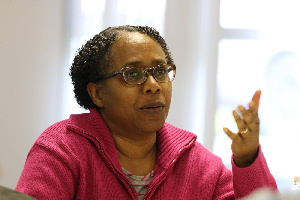Maintaining the right mindset during the novel Coronavirus pandemic

“We must not become so absorbed with the present distress that we forget to enjoy the blessing of life and to hope for the future.”
by Dr. Beverly Gordon
Child & Family Therapist Crozer-Keystone Health &
Co-Chair, Jamaica Diaspora Behavioral Health Taskforce
SOUTH FLORIDA – As the coronavirus pandemic makes its way stealthily from one community to another we find ourselves concerned for the psychological well-being of the human family across the globe.
As members of the Jamaica Diaspora Taskforce Action Network (JDTAN), we cannot help but feel an extra surge of concern for our own people in Jamaica and across the Diaspora. In these uncertain times we are bombarded by multiple challenges to our health and well-being as a people.
The coronavirus pandemic comes at a time when we are already burdened by economic, social, political, and environmental threats and challenges. It is important for us to understand our psychological vulnerabilities and summon our collective reservoirs of resilience to face the difficulties with common-sense, resolve, dignity, and fortitude.
Fear
Fear is a powerful emotion that can generate defensive action or devastating paralysis. I’ve heard some people say that they don’t understand why people are so concerned about the coronavirus when the flu kills many more people every year. The glaring difference is that coronavirus is unfamiliar. Human beings fear most that which they do not understand. Fear of the unknown can be physically and emotionally crippling. Furthermore, we have a vaccine for the flu that gives us a sense of security and control that helps to quell the fear.
As more and more countries report confirmed cases the pandemic becomes too close for comfort. It’s one thing to hear about a crisis or disaster happening somewhere else. The event takes on a completely different meaning when it is happening in our own front yard. The global society of the 21st century has resulted in a heightened awareness of danger. The television screen brings horrifying scenes from every part of the globe directly into our living rooms. Statistics and official-sounding declarations bring home the horror of the pandemic. Even the word “pandemic” sounds intimidating. Many persons are seized with fear of the unknown, the terrible, the disease that has no known cure or antidote.
To overcome crippling fear, we must acknowledge that we are afraid, then employ a problem-solving approach rather than an emotion-based approach to the problem. Rather than focusing on how we feel, focus on what we can do. Assess the situation, plan the necessary steps to be taken, execute the steps, and assess our situation that results from taking the steps. Having done all that we are able to do, our confidence in a positive outcome will increase, and our fear will decrease. Take control of the fear instead of allowing the fear to control you.
Anxiety
Anxiety is often generated by the things that we see and hear. For some of us, watching the news on television, reading the newspaper, or hearing the news on the radio results in our imagination taking off like a runaway train, quickly spinning negative information into fanciful, horrific details of possibilities that may never materialize into probabilities let alone actual facts. The resulting heightened state of anxiety results in hypervigilance, physiological symptoms, irritability, and psychological distress.
Lack of credible information heightens fear and anxiety. This, in turn, can lead to irrational beliefs and behaviors. Be sure to seek credible sources of information about the coronavirus pandemic. The potential danger is real but not inevitable. Reliable information that increases knowledge can reduce anxiety. We’ve probably all heard the saying, “Knowledge is power.” Worrying has never proven to be an effective problem-solving method. Rest, exercise, positive self-talk, trust in a higher power, concern for the well-being of others are all ways that may positively affect mood and decrease anxiety.
Perception of Risk
Some people are thrill-seekers. While many people tend to move away from danger some persons receive great excitement from flirting with danger. A perfect example is an individual who will remain in their beachfront home after the announcement to evacuate because of an impending category five hurricane. These individuals either don’t believe that anything bad will really happen or they enjoy the flirtation with a danger more than they fear the possible negative outcome. In the case of the coronavirus pandemic, such individuals will reject precautionary measures and take unnecessary risks. Personalities differ but try to let common sense rule the day.
Balance & Resilience
Balance is a vital element in dealing with the psychological impact of a pandemic. It is important at this time to maintain a balanced outlook. The gravity of the situation should not be overlooked because then we run the risk of unwittingly facilitating the spread of the disease. On the other hand, there is no need to go overboard in purchasing hand sanitizers and toilet paper. Why hoard all the sanitizing agents when it is just as important to ensure that others have these resources too so that they won’t spread the virus to you?
Social distancing has been recommended. So schools have closed and some people are working from home. Families could sit around at home worrying or feeling trapped. Instead, this time could be used productively to engage and connect as a family. Home projects that may have been sitting undone for a long time may actually get done during this imposed time at home. You might even find ways of generating meaningful dialogue and enjoying each other’s company. While we maintain physical distance from potential contamination with the virus we can devise creative ways of maintaining social connection through the use of technology such as social media, communication platforms, and even the simple telephone.
We must take all the necessary precautions and forgo our inclinations to disregard advice and caution. Yet we must not become so absorbed with the present distress that we forget to enjoy the blessing of life and to hope for the future.

Dr. Beverly Gordon earned her Doctoral degree in Clinical Psychology, her Master’s degree in Counseling Psychology and her Bachelor’s degree in Nursing Education. She is currently employed by Crozer-Keystone Health System as a Child and Family Therapist and also teaches Psychopathology in the School of Graduate Studies at Chestnut Hill College. She is a frequent presenter at seminars, workshops, and retreats related to mental health and relationships. She is originally from Kingston and attended Northern Caribbean University in Mandeville. She taught at Mannings High and Claremont All-Age School.





